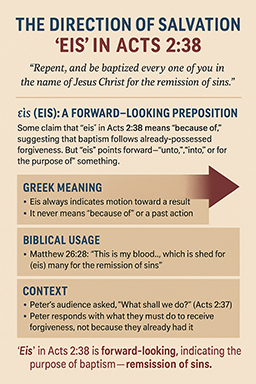Article
Search Articles
Listen
Download Article Summary
Grab a quick summmary to review the highlights of this article.
Download SummaryRelated Articles
Get The Infographic
Get the full sized infopgraphic overview highlighting the key points discussed in this article.
Download Now
The Direction of Salvation: Why "Eis" in Acts 2:38 Is Forward-Looking and Not a Retrospective Reference to the Cross
 Loading author...
Loading author...

The Greek Preposition Εἰς: Its Consistent Forward Direction
The Book of Acts is a crucial source of apostolic doctrine and practice, especially when it comes to salvation. Nowhere is this more evident than in Acts 2:38, where Peter delivers the first sermon of the Church age and commands his listeners: "Repent, and be baptized every one of you in the name of Jesus Christ for the remission of sins, and ye shall receive the gift of the Holy Ghost." (KJV)
The phrase "for the remission of sins" has been the subject of extensive theological debate, especially concerning the Greek preposition εἰς (eis), translated "for" in English. Those who hold to a "faith-only" model of salvation often argue that eis means "because of"—suggesting that baptism is a symbolic act performed because one's sins are already forgiven. This interpretation, however, is linguistically unsound and contextually inconsistent.
Here we build a rock-solid foundation from Greek grammar, biblical usage, and theological logic to demonstrate that "eis" in Acts 2:38 is decisively forward-looking, meaning "unto," "into," or "for the purpose of" the remission of sins—not because of sins already forgiven. The implications are monumental: baptism in Jesus' name is not merely symbolic—it is instrumental in the remission of sins.
The Greek Preposition Εἰς: Its Consistent Forward Direction
The word εἰς is one of the most common prepositions in the Greek New Testament, occurring over 1,700 times. It carries the basic meaning of motion toward or into a place, state, or result. Lexicons uniformly define it this way: BDAG (Bauer-Danker-Arndt-Gingrich) states "to, into, toward, for (indicating purpose or result)," while Thayer's Greek Lexicon defines it as "into, unto, to, towards, for, among," and Strong's Concordance (#1519) describes it as "to or into (indicating the point reached or entered), of place, time, or purpose."
Nowhere in any respected lexicon does εἰς mean "because of." That meaning would require an entirely different Greek word, such as διά (dia) with the accusative meaning "because of" (e.g., Romans 4:25), or ἐκ (ek) meaning "out of," sometimes used for causal implications. In Acts 2:38, εἰς ἄφεσιν τῶν ἁμαρτιῶν ("unto the remission of sins") indicates a goal or result—not a reason for action already completed.
Consistent Biblical Usage of Εἰς
One of the clearest parallels to Acts 2:38 is found in Jesus' own words: "For this is my blood of the new testament, which is shed for (εἰς) many for the remission of sins." (Matthew 26:28, KJV) Here, "εἰς ἄφεσιν ἁμαρτιῶν" is the exact same Greek phrase used in Acts 2:38. The question arises: Did Jesus shed His blood because sins were already forgiven, or so that sins might be forgiven?
The answer is obvious—Christ's blood was shed in order to bring about the remission of sins. No one argues that the cross was a symbolic act done after forgiveness had already occurred. Therefore, by grammatical and theological necessity, "eis" in Acts 2:38 must mean the same as in Matthew 26:28—to attain remission, not to acknowledge it.
This pattern continues throughout the New Testament. In Romans 10:10, we read that "with the mouth confession is made unto (εἰς) salvation." Galatians 3:27 declares, "For as many of you as have been baptized into (εἰς) Christ have put on Christ." First Peter 3:21 speaks of "baptism doth also now save us (not the putting away of the filth of the flesh, but the answer of a good conscience toward (εἰς) God)." Each of these reflects eis or its equivalent leading to an outcome or result—not a reflection on something already done.
Significantly, there is no instance in the entire New Testament where εἰς undeniably means "because of." Attempts to find such examples are strained and fall apart under scrutiny. Even in secular Koine Greek (used outside the Bible), εἰς consistently maintains its directional, forward-looking meaning.
Contextual Evidence from Acts 2
The context of Acts 2 powerfully supports the forward-looking interpretation of εἰς. When Peter's audience heard his sermon, they were "pricked in their heart" and asked, "Men and brethren, what shall we do?" (Acts 2:37) Peter's audience was convicted of sin. They were not saved. They were asking for the solution. Peter's response in verse 38 is the answer to their question—not a celebration of what had already occurred.
If their sins were already remitted, Peter would have said something like: "Believe, because your sins are already forgiven." Instead, he gave a two-part command leading to two results: the command to repent and be baptized, resulting in the remission of sins and receiving the Holy Ghost. This is not reflective—it's prescriptive.
Throughout Acts, baptism is consistently presented as part of the salvation process—not as a memorial of a completed reality. The Ethiopian eunuch asked, "What doth hinder me to be baptized?" (Acts 8:36) Paul was baptized immediately after his encounter with Jesus (Acts 9:18). Most tellingly, in Acts 22:16, we read: "Arise, and be baptized, and wash away thy sins, calling on the name of the Lord." If baptism were simply symbolic, the phrase "wash away thy sins" would be nonsensical. Yet the text links baptism with remission, not commemoration.
Theological and Doctrinal Ramifications
Some argue that baptism must be symbolic because salvation is "not of works." But this misunderstands biblical obedience. Baptism is no more a meritorious work than repentance or confession—it's simply obedience to a divine command (Mark 16:16, Acts 10:48). Salvation is by grace—but grace is accessed by faith, and faith obeys (Hebrews 5:9, Romans 6:17). If Peter, inspired by the Holy Spirit, connects baptism with remission, we have no authority to separate them.
Just as circumcision was the sign of entry into the old covenant (Genesis 17:10), baptism is the marker of entry into the new covenant. It signifies the point at which the repentant believer is united with Christ, buried with Him, and raised to walk in newness of life (Romans 6:3–5, Colossians 2:12). Would God establish a covenant entry point that symbolized something already done before one enters? That would be inconsistent with the entire structure of biblical covenant.
Refuting the "Because Of" Argument
Some English speakers interpret "for the remission of sins" the way we use "for" in "He was arrested for stealing"—meaning "because of." But this is a problem of English idiom, not Greek grammar. Greek is far more precise, and as shown, eis never means "because of" in any parallel construction in the New Testament.
Some attempt to argue that in Matthew 12:41, the Ninevites repented "eis the preaching of Jonah," meaning "because of" it. But again, this is a misunderstanding. The Greek phrase eis to kērygma is better understood as in response to or as a result of the preaching—which is still forward-moving behavior prompted by a prior message. It's not analogous to eis in Acts 2:38 where a result (remission) follows the action (baptism).
Conclusion: A Preposition That Points to Salvation
The evidence is overwhelming. Grammatically, εἰς always points forward to a goal or result. Scripturally, Acts 2:38 parallels Matthew 26:28, showing that forgiveness comes through the act being described—not before it. Contextually, Peter was answering the question "What shall we do?"—not celebrating salvation already received. Theologically, baptism is consistently connected with entering into Christ and receiving remission—not as a post-salvation ritual.
Therefore, any attempt to redefine εἰς in Acts 2:38 as "because of" is linguistically dishonest, contextually forced, and doctrinally dangerous. It undermines the clear connection between repentance, baptism, and the remission of sins laid out by the apostle Peter under the inspiration of the Holy Spirit.
"Then they that gladly received his word were baptized: and the same day there were added unto them about three thousand souls." (Acts 2:41) The early church understood the meaning of eis clearly—and obeyed it. We must do no less.
Tags: